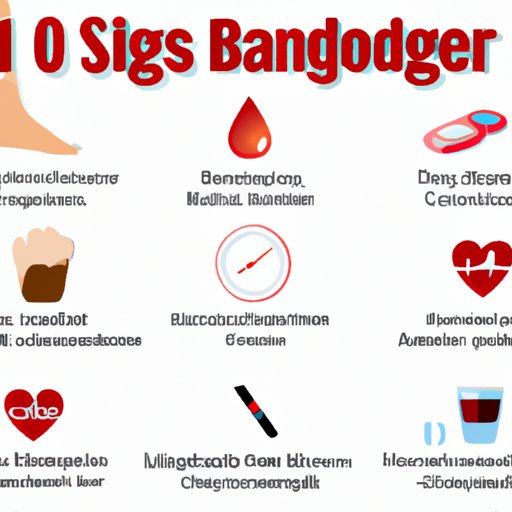
Low Blood Sugar Symptoms: What You Need to Know
Low blood sugar, also known as hypoglycemia, occurs when your blood sugar levels drop below normal. It’s a common problem that affects people with diabetes who take insulin or other medications that increase insulin production. However, it can also occur in people who do not have diabetes.
Recognizing the symptoms of low blood sugar is critical to managing the condition. In this article, we’ll explore the 10 most common symptoms of low blood sugar and provide helpful information on understanding, identifying, and managing hypoglycemia.

10 Common Symptoms of Low Blood Sugar: Recognizing the Signs
Low blood sugar symptoms can vary depending on the individual, but some of the most common symptoms include:
- Shakiness
- Sweating
- Fatigue
- Dizziness
- Irritability or confusion
- Rapid heartbeat
- Pale skin
- Headache
- Blurred vision
- Trembling or feeling weak
If you experience any of these symptoms, it’s important to take action to prevent hypoglycemia from worsening.
Hypoglycemia 101: Understanding Low Blood Sugar Symptoms
Low blood sugar can be caused by a variety of factors, including too much insulin, skipping meals, exercising more than usual, and certain medications. People with diabetes who take insulin or other diabetes medications are at greater risk of developing hypoglycemia. However, anyone can experience low blood sugar if they consume too few carbohydrates, have liver or kidney disease, or have an endocrine disorder.
There are several risk factors that can increase your chances of developing low blood sugar, including:
- Having diabetes
- Being over 60 years old
- Having kidney or liver disease
- Having hormonal imbalances
- Taking certain medications
If you suspect that you may have hypoglycemia, your doctor will perform a blood test to confirm the diagnosis and determine the underlying cause of your low blood sugar.
When Blood Sugar Dips: Identifying and Managing Symptoms of Low Blood Sugar
If you experience low blood sugar symptoms, it’s important to take immediate action to prevent the symptoms from worsening. Here are some steps you can take to manage symptoms of low blood sugar:
- Check your blood glucose levels, especially if you have diabetes
- If your blood glucose levels are low, consume a carbohydrate-containing snack or beverage, such as fruit juice, crackers, or a banana
- If your symptoms persist despite eating, seek medical attention immediately
- Keep a source of glucose with you at all times, such as glucose tablets or a glucagon injection kit
If you have low blood sugar frequently, it’s important to talk to your doctor about adjusting your medication dosage or modifying your diet to prevent hypoglycemia from occurring in the future.
You May Have Low Blood Sugar and Not Even Know It: Symptoms to Look Out For
Asymptomatic hypoglycemia is a less common but equally serious form of hypoglycemia that occurs when someone’s blood sugar levels drop without causing noticeable symptoms. This can occur in people who have diabetes and take insulin or other medications that increase insulin production.
Risk factors for developing asymptomatic hypoglycemia include taking certain medications, drinking alcohol, and having kidney or liver disease. It’s important to test your blood sugar levels regularly if you have diabetes or another condition that increases your risk of hypoglycemia.
Don’t Ignore These Signs of Low Blood Sugar: How to Catch Hypoglycemia Before it Worsens
Several factors can exacerbate low blood sugar symptoms or put you at greater risk of hypoglycemia, including:
- Skipping meals
- Exercising more than usual
- Drinking large amounts of alcohol
- Using medications that increase insulin production
To prevent hypoglycemia from occurring, it’s important to maintain a healthy diet, exercise regularly, and take your medication as prescribed. If you experience low blood sugar symptoms frequently, talk to your doctor about modifying your treatment plan to prevent future hypoglycemic episodes.
Low Blood Sugar Symptoms Explained: A Comprehensive Guide
Recognizing and managing low blood sugar symptoms is critical to preventing hypoglycemia from worsening and causing serious health complications. Here’s a recap of some of the most important points to keep in mind:
- Hypoglycemia occurs when your blood sugar levels drop below normal
- Common symptoms of low blood sugar include shakiness, sweating, fatigue, dizziness, and rapid heartbeat
- Hypoglycemia can be caused by a variety of factors, including too much insulin, skipping meals, and certain medications
- If you experience low blood sugar symptoms, take immediate action to prevent the symptoms from worsening
- Risk factors for developing low blood sugar include having diabetes, liver or kidney disease, and being over 60 years old
- If you have frequent hypoglycemia, talk to your doctor about modifying your treatment plan
Remember that if you experience low blood sugar symptoms frequently, it’s important to seek medical attention to prevent serious complications from occurring.
Conclusion
Low blood sugar is a common problem that can affect anyone, regardless of whether or not they have diabetes. Recognizing and managing low blood sugar symptoms is critical to preventing hypoglycemia from worsening and causing serious health complications. By following the steps outlined in this article, you can take control of your condition and prevent future hypoglycemic episodes.
Remember, if you experience low blood sugar symptoms frequently, it’s important to seek medical attention and talk to your doctor about modifying your treatment plan. With the right care and attention, you can manage your low blood sugar symptoms and enjoy a happy, healthy life.





